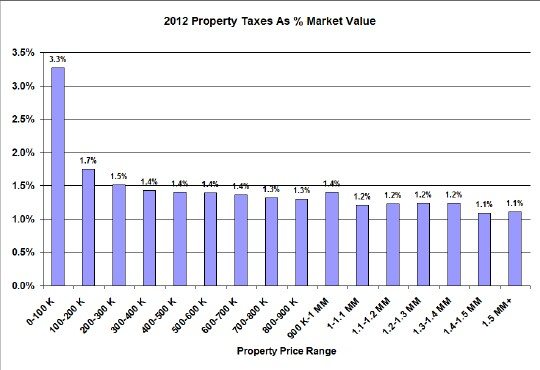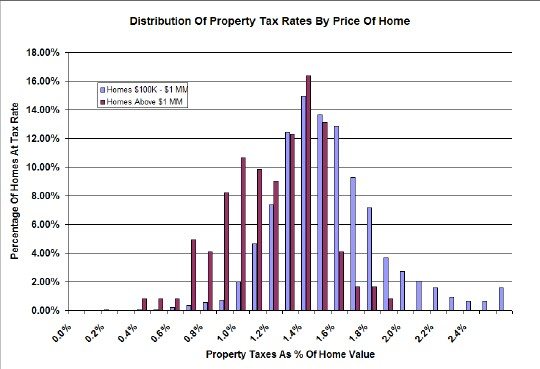Hey, Joe Berrios! You paying attention? Back in August I wrote a post on how Chicago’s property taxes hit the poor disproportionately in which I demonstrated how there was a systematic bias in the county’s assessed values for homes. More expensive homes had more of a negative valuation bias than cheaper homes. The effect was most pronounced for homes worth less than $100K, probably because those prices had fallen so quickly the county couldn’t react fast enough.
As a result of an online discussion on Cribchatter yesterday and a private follow up with one of the participants in that discussion I took a closer look at the data, which revealed that the problem was a bit worse than I thought.
First, I noticed that the graph I used did not reflect an adjustment that I had intended to make for the homeowner exemption, since most of the property taxes out there are reduced by that amount. If left unadjusted it makes the properties look like they were assessed at lower values than they really were. Here is the corrected graph:
Well, this graph starts to look like there is a more significant problem. When you compare 1.1% tax rates against something in the range of 1.6% at the low end (let’s ignore the properties below $100K) you see that the most expensive properties in Chicago enjoy a 31% tax advantage – and that’s on average.
So then I looked at the distribution of tax rates on properties worth between $100K and $1 MM vs. those worth more than $1 MM and you see just how bad it is for some individual properties. In the graph below the bluish bars represent the distribution of property tax rates on homes valued between $100K and $1 MM. The purple bars are homes above $1 MM. You can see the difference pretty clearly.
As my friend pointed out only 4% of the cheaper homes have tax rates below 1% but 30% of the more expensive homes have rates below 1%. In addition, slightly more than 7% of the cheaper homes have tax rates above 2%, while virtually none of the more expensive homes have tax rates above 2%. I attribute this difference to the fact that the attorneys who appeal property taxes for a living heavily solicit people who own expensive homes because they get paid a percentage of the first year savings. If you own a $100K condo you probably never get a solicitation to appeal your property taxes.
In closing I’d like to highlight some of the most egregious instances of undervaluation at the high end in case their neighbors want to make an issue out of it:
- 2537 N Burling sold for $2.31 MM yet is assessed at a $781K 2013 market value
- 2030 N Fremont sold for $2.315 MM yet is assessed at a $881K 2013 market value
- 2430 N Kedzie sold for $1.675 MM yet is assessed at a $352K 2013 market value
- 6139 N Kilpatrick sold for $1.675 MM yet is assessed at a $597K 2013 market value. Interestingly, the MLS records on this sale have been expunged.
But even with a good attorney how do these valuations get stupid low? Unless there is some kind of landmark tax break involved in some of these. Other than reporting these inequities the only thing you can do as a homeowner is make sure your own property is not overvalued, in which case you should file an appeal when the window opens for your township.
#ChicagoPropertyTaxes
If you want to keep up to date on the Chicago real estate market, get an insider’s view of the seamy underbelly of the real estate industry, or you just think I’m the next Kurt Vonnegut you can Subscribe to Getting Real by Email. Please be sure to verify your email address when you receive the verification notice.

